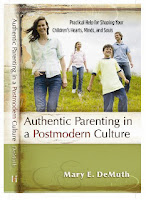

Mary: Completely different. Absolute truth is questioned. Community is applauded over individualism. Conquest and war are appalling to this next generation. We don’t fully know what postmodernism is as much as it is a reaction to the modern era most of us parents grew up in. Today’s kids want reality, authenticity. They’re skeptical. What reaches them? Our authenticity. Our connectedness to God in such a way that invites fellowship.
COD/COG: What can the church be doing to help parents who want to raise a Godly generation now?
Mary: One thing our church is doing is rather unique: some of us who are parenting teenagers come together monthly, along with our kids, to eat a meal together and then break into groups and discuss worldview, movies, Christianity, sharing Jesus, etc. It’s been amazing to stay with our teens through these discussions. I think there needs to be more cross-generational ministries, where parents/grandparents/friends of teens discuss things together, or do ministry alongside each other. The days of segregated ministries (children’s ministry, youth group, college and career, etc.) is waning.
COD/COG: A lot of my readers are children of divorce who are now raising families of their own, and for many of them, having children brings to the surface some of the hidden or un-dealt with issues in their families of origin. What words of encouragement or advice can you offer these parents who are still in the middle of healing from their own childhood wounds?
Mary: Talk about it. Find a good friend who prays. Have him/her pray you through your wounds. Find a mentor—someone whose parenting you admire—and ask lots of questions. Don’t be afraid to go to Jesus for healing, even though doing that may be frightening. It’s never easy to relive pain from the past, but it must be done. We parent from the inside out. If our inside isn’t healed, our outward parenting, no matter how hard we try, will suffer. The best gift you can give your child is not perfecting a parenting method. It’s loving them enough to work on your own issues at the foot of the cross.





